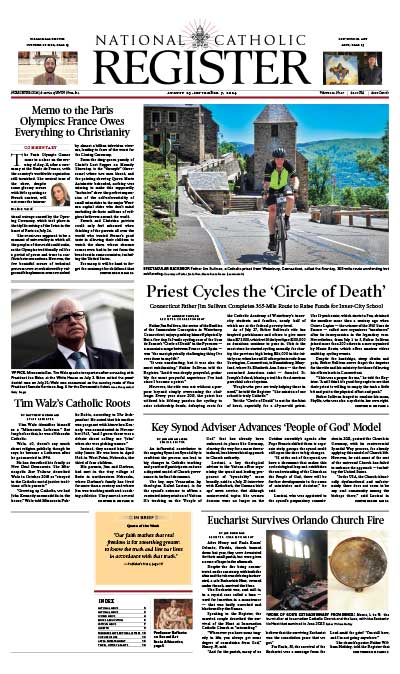Iskali Evangelization Movement Forms and Accompanies Young Hispanics on Faith Journey
The Chicago-based initiative is modeling a successful approach for addressing one of the U.S. Church’s most important challenges.

CHICAGO, Ill. —For José Carlos Sandoval, who emigrated from Mexico to the Chicago area at the age of four with his parents, a love of sports took precedence over the Mass and his Catholic faith as a teenager and young adult.
But after a stint playing professional soccer in Spain, he said, “I was at a point in my life when I was re-evaluating everything.”
It was in that crossroads, some two years ago, that Sandoval accepted a friend’s invitation to attend a retreat offered by the Chicago-based Iskali movement aimed at engaging young Hispanics and forming them as faith leaders.
A core theme of the three-day retreat — God’s love for every person and his desire that we share that love with others — had a transformative impact on Sandoval.
“Thinking about it, it kind of makes you want to cry. I remember the moment, you don’t believe it,” said Sandoval, 26. “How can I be worthy of this love from a stranger? We understood that this is not a love that comes from us: it’s something greater. And it makes you want to love somebody and give that back. It’s so beautiful that you want everyone to experience it.”
At a time when involvement in the Catholic Church is waning among many Hispanics, the success of the Iskali lay apostolate is drawing special attention from those on the front lines of Hispanic evangelization efforts in the U,S.
According to the Pew Research Center, the majority of U.S. Hispanics is no longer Catholic. A 2019 Pew study showed that while 57% of Hispanics identified as Catholic in 2009, that number had declined to 47% in 2019. The number of Hispanics identifying themselves as Protestant rose from 23% in 2009 to 26% in 2017, while the number belonging to non-Christian religions rose from 1% to 3%. In addition, those who identified as atheist, agnostic or “nothing in particular” rose from 16% to 23%.
The United States Conference of Catholic Bishops has responded in a number of ways to the needs of Latino Catholics, including the creation of its Subcommittee on Hispanic Affairs to “provide more opportunities for Hispanic Catholics to engage in the life of the Church and help shape its evangelization mission,” according to the USCCB website. Since 1972, the USCCB has also fostered an initiative called Encuentro — Spanish for encounter — to raise the profile of Hispanics in the U.S. Church and strategize about pastoral practices and priorities, culminating in national Encuentro gatherings.
When the Register spoke to Ricardo Grzona, CEO of the Miami-based Ramón Pané Foundation and its Christonauts spiritual formation program, he pointed to Iskali’s approach as one worth emulating.
“We need more people with determination to do more work like what they do,” Grzona said.
Faith Formation in Community
Based in the Archdiocese of Chicago, the Iskali movement is a Catholic community dedicated to evangelization and committed to missionary discipleship growing in faith in imitation of Jesus Christ and guided by the Holy Spirit. Founded by board member Vicente Del Real in 2010 when he was 20 years old, Iskali “exists to empower and equip young Latinos with high-quality faith formation” and leadership.
“Iskali believes in young people and the power of faith and community to help individuals reach their full potential,” its website states. The movement has 11 active communities in Chicago, Indianapolis, and Milwaukee, a podcast reaching the United States and dozens of other countries, and operates the Casa Iskali retreat center near Chicago. Casa Iskali has a chapel, dorms, conference center, and sports facilities used by the Iskali movement, Catholic schools and organizations.
According to its website, “Iskali” is a word that comes from the Náhuatl (Aztec) language of Mexico, which means growth, resurgence and renewal.
“It was not a strategy,” Del Real told the Register about Iskali’s founding. “It was a calling to respond to the needs of his people. My calling is to accompany and form young Latinos living in the U.S. When God calls us, He opens up the way to help us serve with a career to achieve goals. He has taught us how to reach the hearts of young people.”
Iskali focuses on young people ages 18-30. “From the standpoint of our faith, we work to help young people bloom as human beings and become what God wants them to be in their lives,” he said.
Del Real described four pillars that underpin the movement: initiatives to foster faith in Jesus; mentorship; scholarship funds; and sports and wellness activities. Of the first pillar, Del Real said, “It’s an encounter with the person of Jesus Christ that produces immeasurable effects. We promote that encounter so that these young people can know Jesus and have Him in their lives.”
Iskali’s programs are conducted in English, Spanish, or a blend of the two, a pattern of speech that is common among young Hispanics. “Young Hispanics learn their prayers in Spanish from their parents, even though English may now be their dominant language,” Del Real observed.
“Many of the young people we have at Casa Iskali were unengaged in the Church,” Del Real said, “but 80% percent who come to Iskali end up returning to the Church.” Citing an Iskali survey, Del Real also said that the same percentage of participants escaped an addiction or bad habit following a retreat.
Inspired by their positive experiences, Iskali participants have become involved in parish councils, nonprofits, and going on to higher education. Some have also married in the Church.
Breaking Down Walls
An initial retreat at Casa Iskali typically goes from a Friday evening until Sunday morning, with ice-breakers, skits, faith formation, Eucharistic adoration, and Mass. At the most recent retreat, there were 60 retreatants and 25 servers.
“It was not a classroom setting,” Sandoval said. “You were presented with opportunities to make decisions about your life. We were put into a position whether we will stick to our old ways or break out of those chains that have limited us. And we decide. We are not forced. We were presented with the truth that we are children of God and loved and saved. We see other young adults share their faith through acts of love and faith.”
Sandoval described the deep emotions that welled up on his retreat.
“When you don’t see it coming, it breaks down walls in a positive way, especially if you are a person who is not used to love,” he said. “There was an expression of love that some people have never felt, have never seen in their lives.”
After that experience, he said, “I decided I wanted to change my role in life and what I’m called to do.”
Sandoval told the Register, “Before the Iskali retreat, my faith was not very deep. My life was empty and I tried to fill it with parties, alcohol, and girlfriends. After I changed, my relationship with my family improved. No family is perfect, and I had to work to understand my parents and forgive them. So, it’s better and more intimate now. Because of the Iskali retreat, I deepened my relationship with my parents and love them more.”
Having recently returned from a course for up-and-coming business leaders held at Stanford University, Sandoval said that another benefit of putting his life back together is that his food import business and his relationship with his employees have greatly improved. “When they saw I had changed, they were also inspired and have strengthened their faith,” he said.
“I was about to lose my business because I had not found God and myself yet. I’ve put my life and business on track, go to work on time, and see the business grow,” he said. “Being spiritually centered has helped me in every way.”
- Keywords:
- iskali evangelization
- hispanics
- hispanic catholics
















